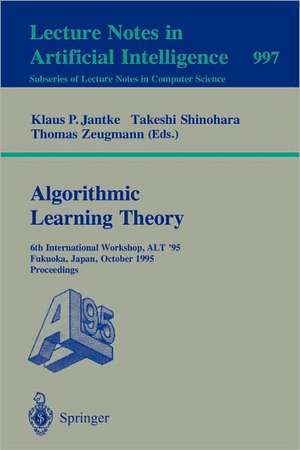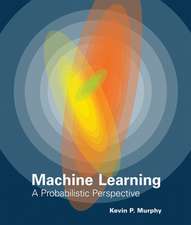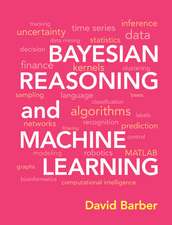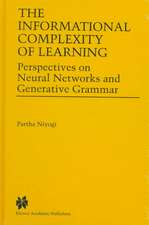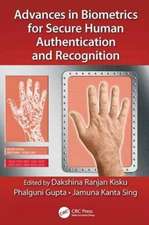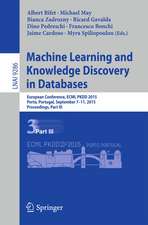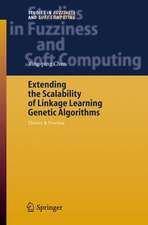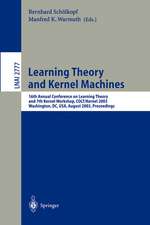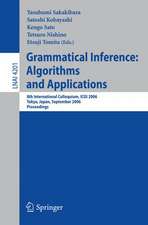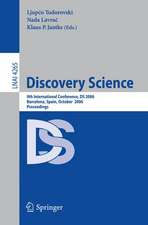Algorithmic Learning Theory: 4th International Workshop, ALT '93, Tokyo, Japan, November 8-10, 1993. Proceedings: Lecture Notes in Computer Science, cartea 744
Editat de Klaus P. Jantke, Shigenobu Kobayashi, Etsuji Tomita, Takashi Yokomorien Limba Engleză Paperback – 20 oct 1993
Din seria Lecture Notes in Computer Science
- 20%
 Preț: 1061.55 lei
Preț: 1061.55 lei - 20%
 Preț: 307.71 lei
Preț: 307.71 lei - 20%
 Preț: 438.69 lei
Preț: 438.69 lei - 20%
 Preț: 579.30 lei
Preț: 579.30 lei -
 Preț: 410.88 lei
Preț: 410.88 lei - 17%
 Preț: 427.22 lei
Preț: 427.22 lei - 20%
 Preț: 596.46 lei
Preț: 596.46 lei - 15%
 Preț: 448.04 lei
Preț: 448.04 lei - 20%
 Preț: 353.50 lei
Preț: 353.50 lei -
 Preț: 389.49 lei
Preț: 389.49 lei - 20%
 Preț: 309.90 lei
Preț: 309.90 lei - 20%
 Preț: 645.28 lei
Preț: 645.28 lei - 20%
 Preț: 763.23 lei
Preț: 763.23 lei - 15%
 Preț: 580.46 lei
Preț: 580.46 lei - 20%
 Preț: 310.28 lei
Preț: 310.28 lei - 20%
 Preț: 655.02 lei
Preț: 655.02 lei - 20%
 Preț: 1183.14 lei
Preț: 1183.14 lei - 20%
 Preț: 340.32 lei
Preț: 340.32 lei -
 Preț: 449.57 lei
Preț: 449.57 lei - 20%
 Preț: 591.51 lei
Preț: 591.51 lei - 18%
 Preț: 938.83 lei
Preț: 938.83 lei - 20%
 Preț: 337.00 lei
Preț: 337.00 lei - 20%
 Preț: 649.50 lei
Preț: 649.50 lei - 20%
 Preț: 607.40 lei
Preț: 607.40 lei - 20%
 Preț: 1414.79 lei
Preț: 1414.79 lei - 20%
 Preț: 1024.44 lei
Preț: 1024.44 lei - 20%
 Preț: 583.40 lei
Preț: 583.40 lei - 20%
 Preț: 453.32 lei
Preț: 453.32 lei - 20%
 Preț: 575.49 lei
Preț: 575.49 lei - 20%
 Preț: 1075.26 lei
Preț: 1075.26 lei - 20%
 Preț: 585.88 lei
Preț: 585.88 lei - 20%
 Preț: 825.93 lei
Preț: 825.93 lei - 17%
 Preț: 360.20 lei
Preț: 360.20 lei - 20%
 Preț: 763.23 lei
Preț: 763.23 lei - 20%
 Preț: 340.32 lei
Preț: 340.32 lei - 20%
 Preț: 504.58 lei
Preț: 504.58 lei - 20%
 Preț: 369.13 lei
Preț: 369.13 lei - 20%
 Preț: 580.93 lei
Preț: 580.93 lei - 20%
 Preț: 343.62 lei
Preț: 343.62 lei - 20%
 Preț: 350.21 lei
Preț: 350.21 lei - 20%
 Preț: 583.40 lei
Preț: 583.40 lei - 20%
 Preț: 583.40 lei
Preț: 583.40 lei - 15%
 Preț: 438.59 lei
Preț: 438.59 lei - 20%
 Preț: 341.95 lei
Preț: 341.95 lei - 20%
 Preț: 238.01 lei
Preț: 238.01 lei - 20%
 Preț: 538.30 lei
Preț: 538.30 lei
Preț: 339.80 lei
Preț vechi: 424.75 lei
-20% Nou
Puncte Express: 510
Preț estimativ în valută:
65.03€ • 70.61$ • 54.62£
65.03€ • 70.61$ • 54.62£
Carte tipărită la comandă
Livrare economică 22 aprilie-06 mai
Preluare comenzi: 021 569.72.76
Specificații
ISBN-13: 9783540573708
ISBN-10: 3540573704
Pagini: 444
Ilustrații: XI, 428 p.
Dimensiuni: 155 x 233 x 23 mm
Greutate: 0.62 kg
Ediția:1993
Editura: Springer Berlin, Heidelberg
Colecția Springer
Seriile Lecture Notes in Computer Science, Lecture Notes in Artificial Intelligence
Locul publicării:Berlin, Heidelberg, Germany
ISBN-10: 3540573704
Pagini: 444
Ilustrații: XI, 428 p.
Dimensiuni: 155 x 233 x 23 mm
Greutate: 0.62 kg
Ediția:1993
Editura: Springer Berlin, Heidelberg
Colecția Springer
Seriile Lecture Notes in Computer Science, Lecture Notes in Artificial Intelligence
Locul publicării:Berlin, Heidelberg, Germany
Public țintă
ResearchCuprins
Identifying and using patterns in sequential data.- Learning theory toward Genome Informatics.- Optimal layered learning: A PAC approach to incremental sampling.- Reformulation of explanation by linear logic toward logic for explanation.- Towards efficient inductive synthesis of expressions from input/output examples.- A typed ?-calculus for proving-by-example and bottom-up generalization procedure.- Case-based representation and learning of pattern languages.- Inductive resolution.- Generalized unification as background knowledge in learning logic programs.- Inductive inference machines that can refute hypothesis spaces.- On the duality between mechanistic learners and what it is they learn.- On aggregating teams of learning machines.- Learning with growing quality.- Use of reduction arguments in determining Popperian FIN-type learning capabilities.- Properties of language classes with finite elasticity.- Uniform characterizations of various kinds of language learning.- How to invent characterizable inference methods for regular languages.- Neural Discriminant Analysis.- A new algorithm for automatic configuration of Hidden Markov Models.- On the VC-dimension of depth four threshold circuits and the complexity of Boolean-valued functions.- On the sample complexity of consistent learning with one-sided error.- Complexity of computing Vapnik-Chervonenkis dimension.- ?-approximations of k-label spaces.- Exact learning of linear combinations of monotone terms from function value queries.- Thue systems and DNA — A learning algorithm for a subclass.- The VC-dimensions of finite automata with n states.- Unifying learning methods by colored digraphs.- A perceptual criterion for visually controlling learning.- Learning strategies using decision lists.- A decomposition basedinduction model for discovering concept clusters from databases.- Algebraic structure of some learning systems.- Induction of probabilistic rules based on rough set theory.
